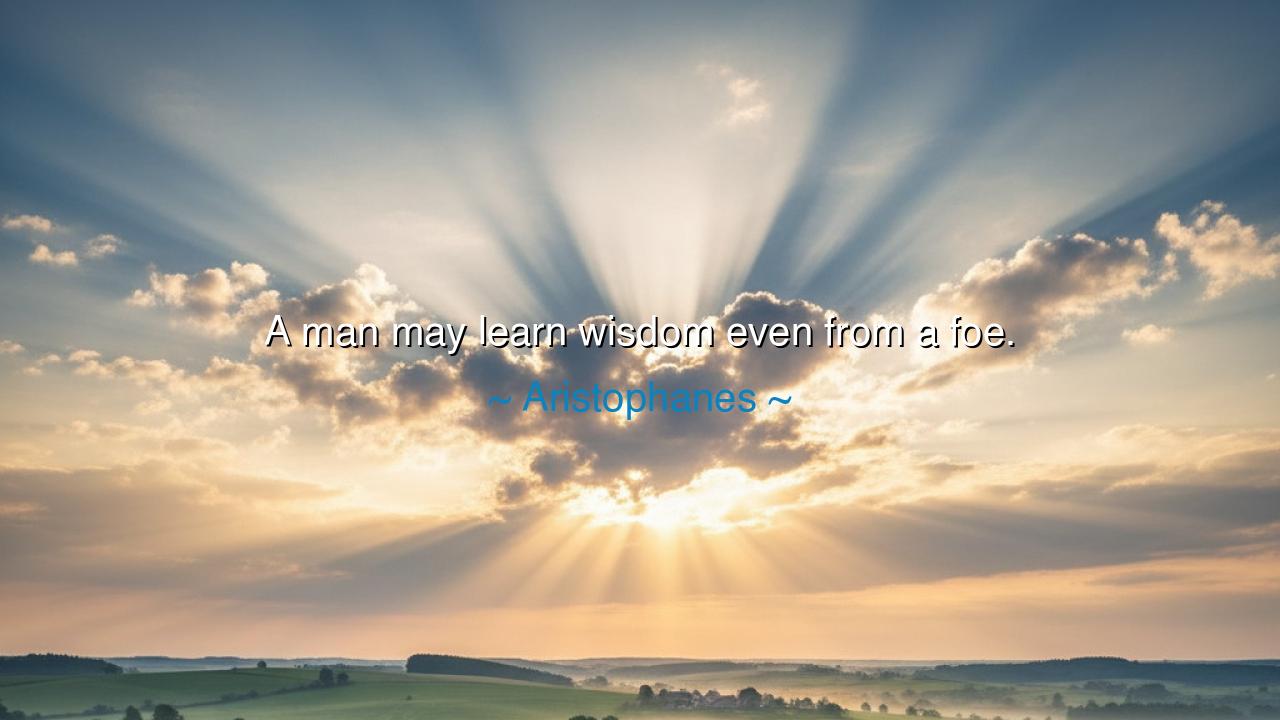
A man may learn wisdom even from a foe.






“A man may learn wisdom even from a foe.” These words from Aristophanes, the great comedic playwright of ancient Greece, carry with them a profound truth: that wisdom is not always found in places of comfort, among friends or allies, but can often emerge from the challenges posed by an adversary. Aristophanes knew that conflict, though painful, is often a powerful teacher, revealing truths about the world, others, and even ourselves that we might not see in times of peace. In this way, even a foe can be a source of growth, for the lessons they impart are not always in defeat, but in the strength required to face them and the wisdom gained from overcoming challenges.
The ancient Greeks themselves lived in a world where conflict was constant, whether in the form of wars between city-states or in the intellectual debates that were part of daily life. Socrates, the greatest of philosophers, spent much of his life engaging with those who disagreed with him. It was in these disagreements that his wisdom flourished. Socrates believed that the act of questioning, even when faced with opposition, could lead to greater truth. Wisdom, for him, was not something to be simply learned from friends, but something to be forged in the fire of intellectual struggle. His dialogues were filled with challenges and debates that forced him to refine his thoughts, thus learning even from those who were, in many ways, his foes.
Aristophanes himself used the foe as a vehicle for wisdom in his plays, often portraying his enemies humorously, but with a sharp insight into the flaws of society. His comedies, while filled with laughter, also carried deeper messages about human nature, politics, and morality. For example, in his play Lysistrata, the women of Athens wage a battle against their husbands by refusing to engage in intimacy until peace is achieved. This comedic conflict brings to light the futility of war and the wisdom of compromise, showing that even through humor and adversity, great truths about society can be discovered.
One of the greatest examples of learning from a foe comes from the story of Alexander the Great and his rival, King Porus of India. Though they fought a fierce battle at the Battle of the Hydaspes River, Alexander was so impressed by Porus’s courage, leadership, and dignity in defeat that he not only spared his life but made him an ally. Alexander recognized the wisdom in Porus's leadership, acknowledging that even in battle, there was much to learn from a worthy adversary. The encounter showed that foes, through their strength, can reveal our weaknesses and help us grow.
Thus, Aristophanes teaches us that the presence of a foe is not always a curse, but an opportunity. The adversary, whether in thought, word, or action, challenges us to reflect, to strengthen our own beliefs, and to sharpen our intellect and resolve. Even when we clash with those who oppose us, there is wisdom to be found in the struggle itself, for it forces us to examine not just the world around us, but ourselves.
In conclusion, let us embrace the lesson that wisdom often comes from unexpected sources. Even the foe — the one who stands in opposition to us — can offer insights that bring us closer to understanding. Socrates, Alexander, and countless others knew that wisdom is not merely about agreeing with those who are like us, but about engaging with those who challenge us, learning from their strengths and our weaknesses.






BBo
It’s a provocative thought that even those we distrust or dislike can offer valuable lessons. I wonder if people today are too quick to dismiss criticism from those they consider enemies. Could intentionally seeking wisdom from opposing perspectives reduce conflict, or would it simply create more tension? And is there a line where listening becomes compromising one’s principles, or is every lesson worth considering, no matter the source?
TTThanh Thu
This quote makes me reflect on personal experiences where someone I considered an adversary ended up offering unexpected insights. Is it possible that our foes highlight our blind spots more clearly than our friends do? I’m curious about the psychological mechanisms behind learning from someone we dislike. Does the friction between opposing views sharpen understanding and push us toward a deeper, more honest kind of wisdom?
Hhoang282
The notion that a foe can be a teacher makes me question how we define wisdom. Is wisdom about the content of knowledge, or the courage to accept it regardless of the source? I also wonder if modern society undervalues lessons from opponents because of polarization and tribal thinking. How could we cultivate the mindset to see enemies as potential teachers without compromising our values or self-respect?
TSTran Selina
I find this quote both simple and profound. It suggests that wisdom isn’t limited by relationships or loyalty, but by our willingness to listen. But in practice, how easy is it to learn from someone who actively works against us? Could the very act of extracting a lesson from an adversary change our perception of conflict itself, making disagreements more productive rather than purely combative?
UGUser Google
This idea really challenges the notion that we should only learn from friends or mentors. How do we differentiate between genuine wisdom and manipulative influence when it comes from a foe? It seems risky, yet potentially rewarding, to consider opposing perspectives as sources of insight. Perhaps there’s a lesson in humility here—are we open enough to admit that someone we dislike might teach us something valuable?